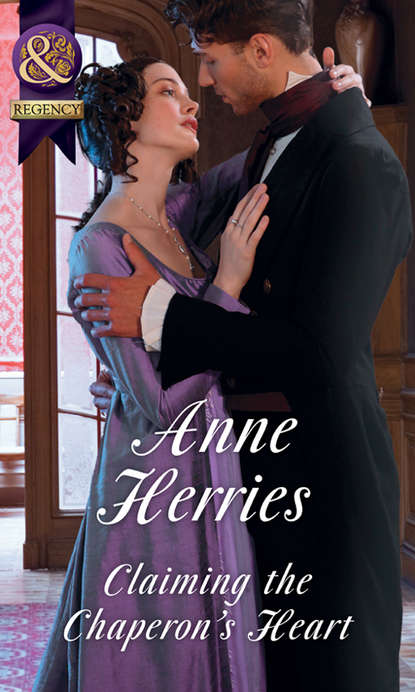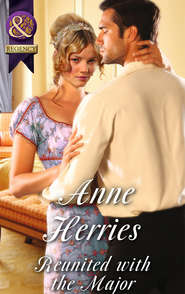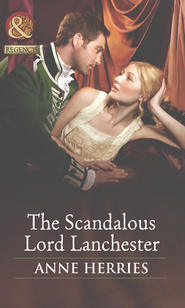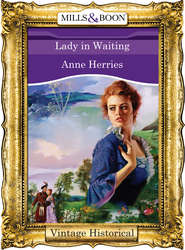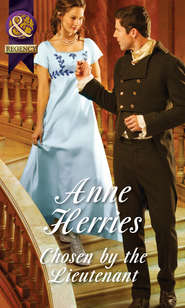По всем вопросам обращайтесь на: info@litportal.ru
(©) 2003-2025.
✖
Claiming The Chaperon's Heart
Настройки чтения
Размер шрифта
Высота строк
Поля
‘Yes, I think he does,’ Adam said with a small smile and for a moment his eyes seemed to dwell on Lady March and his friend. ‘Though we may keep our horses in Ireland and train them there...’
‘Papa told me that the best horses came from Ireland...’
‘Well, perhaps,’ Adam agreed, ‘but I like Spanish myself. Spanish bred and trained in Ireland—a winning combination...’
‘How clever you are,’ Melia said, gazing up at him. Her fingers fluttered on his arm and she felt almost faint when he smiled down at her. ‘Do you intend to stay in England, Captain?’
‘I dare say I shall divide my time between London and Ireland,’ he told her. ‘We shall race the horses here, you see—but I must visit them often. However, I prefer to live in London. It is the heart of things...but I do not mind travelling. I have had adventures enough for any man, and must find a good house where a sensible woman could be happy. I think my wife must love London, as I do, but be prepared to visit Ireland and other parts with me from time to time.’
‘Oh, yes, she would surely wish to do that,’ Melia said, quite carried away by such an enticing picture. ‘To live in London for most of one’s life must be heaven...though it is pleasant to walk in the country when the weather is good.’
‘Yes, exactly,’ Adam said and smiled again. ‘I think we are to see a good play this evening. It is a comedy, I believe, and then we shall be entertained by a dancer. I am led to understand that she is wonderful to behold but I shall reserve judgement. I have seen a great deal of dancing in India.’
‘Oh, yes, how exciting that must have been,’ Melia said and her fingers curled about his arm. ‘You must tell me all about it.’
‘Not this evening for we must be quiet now the lights are going down,’ he whispered, ‘but perhaps I can take you driving in the park in the morning...’
She indicated that she would love that above all things and then was silent for the play had begun and Melia, like everyone else, was soon laughing at the scandalous romp Mr Sheridan had written for their amusement. Melia knew that it had first been acted upon the stage in 1777 and was much admired, but she had not expected to be so amused by the intrigues unravelling upon the stage.
When, after the performance, she and Lady March were taken for a light supper consisting mainly of ices, sweet trifles and jellies for the ladies, and bread, cold meat and cheese for the gentlemen, accompanied by wine or a cool, crisp sweet cider.
Later, after they had been escorted home in Lord Frant’s very comfortable carriage, the gentlemen had said their goodbyes and they were about to depart to their own rooms, Melia asked Jane what she had thought to the play.
‘Very amusing,’ Jane said. ‘I had seen it years ago when my mama took me, but I believe I appreciated it more this time.’
‘Some of it went over my head, I must admit,’ Melia said, ‘but Viscount Hargreaves explained it all to me.’
‘How very kind of him,’ Jane said and hid her amusement, for only a very innocent mind would need to have the play explained and she did not think Melia that innocent and she certainly was not stupid, and so it seemed she had enjoyed having it all explained to her. Perhaps for the purpose of inviting the viscount’s whole attention? ‘I am glad that you enjoyed your evening, my dear.’
‘Oh, yes, very much,’ Melia replied, a small satisfied smile on her lips.
They parted, each to their own rooms—Melia to dream of a handsome face and a young god coming down from the heavens to bear her off with him to celestial heights, and Jane to wonder if she’d served her brother a bad turn by accepting what she’d imagined a harmless invitation to the theatre.
For her it had been a pleasure. Paul Frant was an attentive host, making sure that the ladies were served with cooling drinks between the acts of the play, and taking them to a very pleasant supper in a private booth afterwards. Enjoying herself more than she had for some time, Jane had not become aware of the way Melia was flirting with Viscount Hargreaves until halfway through supper. She’d wondered then how long it had been going on—the little intimate smiles, the light touches on his arm and that ingenuous way of looking up as if in awe of his superior intelligence.
It was what every young lady on the catch for a husband learned to do, though some did it much better than others. Where some inexperienced young ladies might have seemed coy, Melia played the sweet innocent to perfection. Her aunt must have told her that gentlemen did not care for clever women or some such nonsense. Jane felt such behaviour to be deceitful, especially when the girl in question was perfectly capable of understanding and coping with most situations alone; to pretend misunderstanding or to act as if one were a weak and vulnerable female in need of a gentleman’s strong arm was not something Jane would have resorted to. She believed in calling a spade a spade and taking one’s life in one’s own hands whenever possible, but perhaps some gentlemen did prefer the childish woman that Melia portrayed so well at times.
Knowing how firmly Melia spoke out for her own opinions in the matter of dress or other domestic matters, Jane thought her husband would soon be relieved of any such misapprehension once she was mistress of his home. Melia liked her own way and she’d heard her argue with Will over a horse he’d considered too strong for her to drive when he’d given her lessons in a light phaeton that his sister knew he’d had made especially for her. Will knew her as the wilful and sometimes headstrong girl she was and loved her, but in trying to trap the viscount with a sweet modesty that was not her own Melia was, in Jane’s opinion, behaving badly.
She sighed as she unpinned her hair and her maid brushed it for her, the slightly waving length of it tumbling way past her shoulders. Jane had told Tilda not to sit up but she might as well have saved her breath, for her faithful servant had replied huffily, ‘The day I can’t sit up for you, my lady, you may give me my pension and send me off.’
‘I couldn’t possible manage without you,’ Jane told her affectionately. ‘You will have to go on for many years yet. I’m sorry, Tilda, but you must train a girl to care for me as you do before you think of retiring.’
Tilda had given her a dark look and muttered something that Jane could not hear and diplomatically ignored. The girl had come to her via her mother, a shy young thing of fifteen when she first worked for the family; employed in the nursery, she’d worked her way up to become Jane’s maid, had gone with her to Spain and France when Harry was fighting under Wellington, and been a tower of strength when his death had almost killed Jane. Indeed, she did not know whether she could have borne it without Tilda and some other friends who had supported her in her grief.
After Tilda had wished her pleasant dreams and left her, Jane felt too restless for sleep. She looked at the portrait of her husband that she had kept by her bed since it was first given her as one of many presents from an adoring lover, for Harry had remained the ardent lover to the end. Sighing, she replaced the jewelled trinket in its place and walked to the window to look out at the night sky. Jane’s heart had been broken when she lost the man she loved, and she would not wish such pain on her darling brother. If Melia’s heart had been captured and her head turned by the dashing soldier, she would feel responsible—though, of course, they could have met at any time during the round of parties and dances that were about to begin.
Jane sat on the edge of the bed then lay back against a pile of soft pillows, another sigh escaping her. Was it only Will’s disappointment that hung over her like a heavy cloud—or was there more?
She could not be certain. The evening had been pleasant, much of that deriving from the gentle smile and amusing conversation offered by Lord Frant. There was something about him that had made her very aware of him from their first meeting, but she could not put her feelings into words. He was direct, strong-willed and would make a bad enemy, of that she was sure—but to her he showed only courtesy, though she was certain he’d intended to quarrel with her that first morning.
What had made him change his mind? Jane puzzled over it, but could find no reason for the thunderstruck look on his face as he’d stared at her. A vainer woman might have hit upon the truth, but Jane had never thought herself either beautiful or desirable. She dressed in good clothes that suited her and were considered elegant by others, but, since she only glanced in the mirror when she dressed or changed her clothes, she was not aware that she was a striking woman with good strong features and fine eyes.
It would be vain indeed to imagine that a man like Paul Frant had fallen instantly in love with her and the thought never entered Jane’s mind. He was a man of the world, obviously wealthy and experienced in business matters. She could only think that he’d been surprised—he had mentioned that he’d thought she would be older, so that must be it.
Her own feelings had shocked her, because she’d liked him despite her determination not to. His letter had been abrupt and she’d been ready to think him a villain for turning Melia and her sister from their home, but indeed that had been the lawyers, who had since been put in their place and were now doing all they could to make amends. Paul Frant was a long way from being the most handsome man she’d met; indeed, his friend Adam Hargreaves put him in the shade and was a viscount to boot rather than a mere lord. As a girl, Jane had been expected to look higher and her husband’s title had not been considered one of importance. She’d married for love, with her mother’s approval and her half-brother’s grudging permission, and, until fate had taken everything away, she’d been very happy.
Jane did not feel it would be possible to love like that again. Surely any other attachment she might form would pale into insignificance against the love she’d known—and, that being the case, she’d more or less made up her mind not to marry again. It was better to be a widow and independent rather than find oneself trapped into a less than perfect marriage.
Yet Jane could not deny that it was comfortable having a man to care for one’s comfort, even if one was capable of arranging things for oneself. Will had never interfered in her arrangements, but she’d known he was there if she’d needed a male opinion on any matter of business. Living with her brother had suited her well, but she had her doubts about living in Bath with a female companion.
As yet there had been no reply to her letter to Cousin Sarah, which had surprised Jane a little. She’d thought the girl would be only too happy to accept the offer of becoming her companion. She’d made it clear that, though she would be accepted as family, she would be given an allowance that would make her independent and able to buy the small luxuries of life that made the difference between drudgery and content.
Perhaps the letter had been lost between Sarah’s home and hers. She would wait another week or so and then write again.
Chapter Five (#ulink_68d08fdd-e2b3-5bc6-b70f-68575a1386f9)
Having made what amends he could to the Bellingham sisters, Paul was giving some thought to disposing of their father’s estate. He had paid a fleeting visit when he first came to England, expecting Melia to be living there under the guidance of Lady Moira. He had not stayed more than an hour to take some refreshment before pushing on, but he had naturally found his way to the library, and what he discovered there was pleasing. Bellingham had obviously been something of a collector and there were some books Paul would like to keep on the shelves. He’d decided he would have all the books transferred to his library in London for the time being, and gradually sort out those he ultimately wished to keep; the others could be sent elsewhere once he’d had the leisure to go through them and would in the meantime fill the large spaces in what had once been his great-grandfather’s excellent collection.
Paul sighed as he looked up from the letters he was writing to his man of business. It had occurred to him that there might be some pieces of furniture at the Bellingham estate that he would like for his London home. As yet, he had purchased very little and in truth was not much inclined to it, though he knew he must furnish his town house in style before he could entertain properly—yet the prospect of searching various cabinet makers was daunting for a man who had never bothered with such things. He could leave it to an agent, of course, or— The thought that he might consult Lady March on the matter brought a smile to his lips. As his wife, she would have the freedom to purchase anything she chose, but he could not convince himself that he was making any impression on her inner calm. Perhaps if he were to beg for her help in choosing the furniture for his house it would bring them closer together—of course, she would quite likely refuse but nothing ventured, nothing gained...
He’d noted with some amusement the flirtation between Adam and the young girl who was by her father’s will his ward, but as he believed the viscount to be trustworthy he had no qualms. Adam would not step beyond the line, and had already confided that he was on the lookout for a wife. Paul would have no objection, should his permission be sought, though he was not sure she was the wife he would have chosen for his friend. Paul did not intend to be critical, but her artless sighs, smiles and pouts seemed artificial to him and he wondered that Adam should be taken in by them—or perhaps he was making too much of the thing and the pair were merely enjoying a flirtation.
Had Paul thought much about his friend’s state of mind, he would have imagined that Adam had been more than a little in love with the beautiful Annamarie, though he had never said as much. The proud girl had shown her own preference for Paul, and Paul had seen her snub several of Adam’s fellow officers. That would probably have been enough to prevent Adam from speaking, even if his heart were engaged, for his pride would not have taken kindly to such a snub.
Oh, well, there was no point in dwelling on something of which he had no real knowledge. Paul played with his pen for a few moments longer and then a smile touched his lips as he began to write. As yet he had not received a single invitation to an affair at which he could be sure of meeting the lady he wished to meet, but perhaps if he invited her to help him choose the new furnishings for his house, that would provide a reason for them to meet more often...
Вы ознакомились с фрагментом книги.
Приобретайте полный текст книги у нашего партнера:
Приобретайте полный текст книги у нашего партнера:





